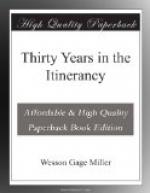But it was evident to all that a serious embarrassment must be overcome to secure a change of the General Rules. The Constitution of the Church has a provision which, to effect a change, requires a two-thirds vote in the General Conference, and a three-fourths vote in all the Annual Conferences. To obtain the requisite vote with these provisions, it will be seen, can only be realized on such questions as can command great unanimity of sentiment. If the entire South had gone off in the separation, the trouble would have been at an end, but, as we have seen, the border Conferences remained with their brethren of the North, and aided them in fighting the first battle with the slave power.
But now, when the question of a change of rule was brought forward, they took the other side, and in doing so were able to furnish enough votes to defeat the proposed measure. And the question, which was now agitating the Annual Conference, was the framing of such a rule as would meet the approval of the great body of the Church, and pass it along the line of the Conferences to secure their favorable consideration before taking it to the General Conference.
At the preceding session of the Wisconsin Conference such a rule had been framed and sent on its way to the several Conferences to obtain their approval. This was called the “Wisconsin Conference Rule,” and read as follows: “The buying, selling, or holding of a human being as a slave.” This rule received very general favor among the Northern Conferences, but was rejected of course by those lying along the border.
At the Conference now in session in Racine, as before stated, a report was submitted touching this matter. And it was intended to so set forth the sentiment of the Conference as to make it a test of eligibility in the election. I subjoin an extract from the resolutions adopted:
“Resolved, That we contemplate with feelings of deep humility and sorrow before God, that the M. E. Church has any connection with the system of American Slavery, and that we will not cease our efforts for extirpation until the last ligament is severed.”
“Resolved, That we record with gratitude, the favor with which the ‘New Rule,’ proposed by our Conference at its last session, has met in so many of the Conferences in which it has been acted upon, and we believe that the principle involved in it is the standard at which the Church should and will soon arrive.”
“Resolved, That whether or not the next General Conference adopt it as a substitute for our present General Rule on Slavery, we earnestly request that body to so modify the Chapter on Slavery as to prevent the admission of any slaveholder into the M. E. Church, and secure the exclusion of all who are now members, if they will not, after due labor, emancipate their slaves.”




